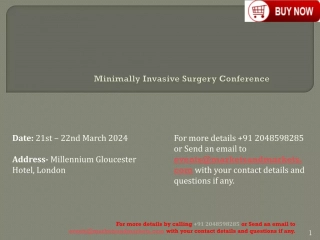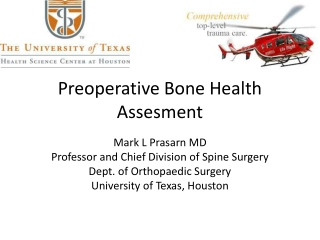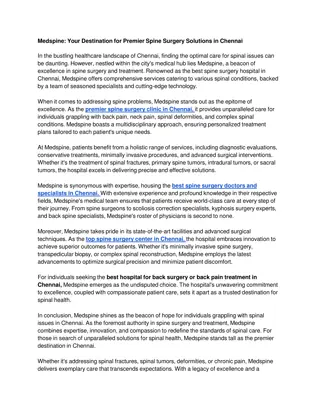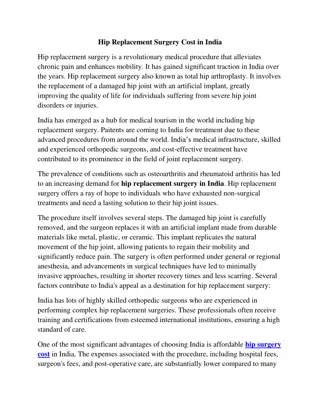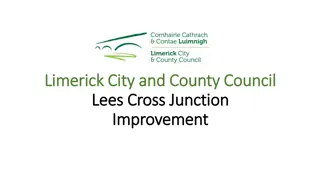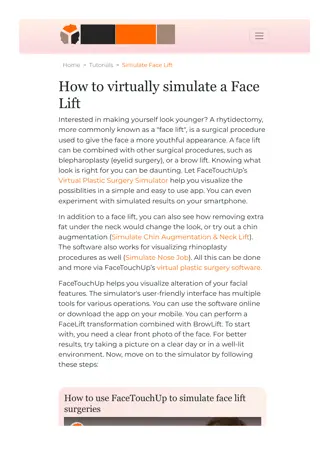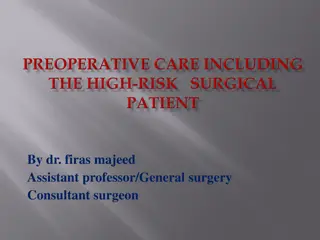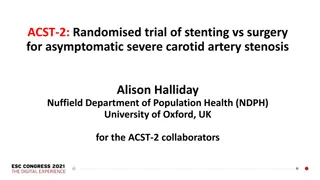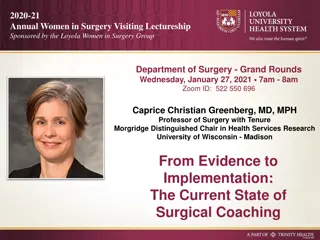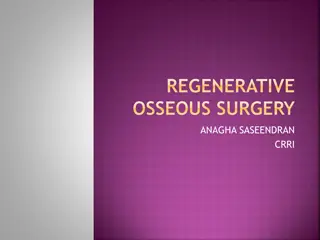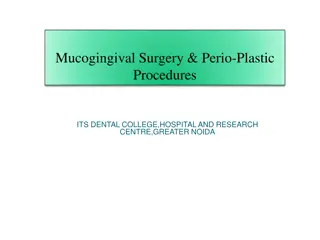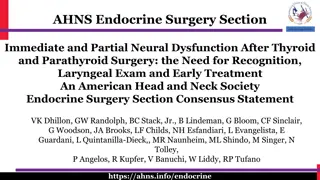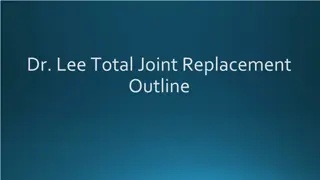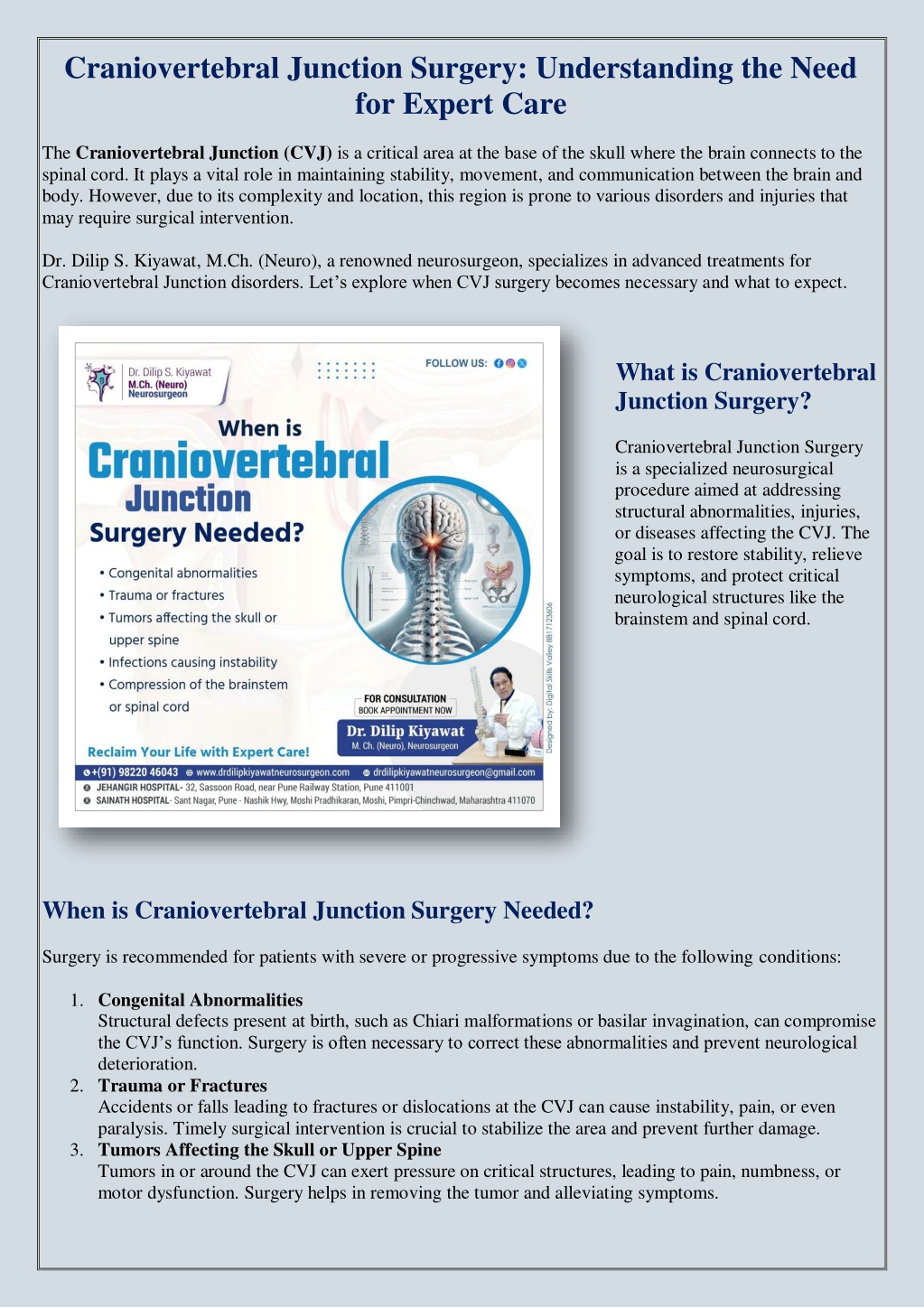
Craniovertebral Junction Surgery
This provides information about Craniovertebral Junction Surgery. The surgery may be required for congenital abnormalities, trauma or fractures, tumors affecting the skull or upper spine, infections causing instability, or compression of the brainste
Download Presentation

Please find below an Image/Link to download the presentation.
The content on the website is provided AS IS for your information and personal use only. It may not be sold, licensed, or shared on other websites without obtaining consent from the author. Download presentation by click this link. If you encounter any issues during the download, it is possible that the publisher has removed the file from their server.
E N D
Presentation Transcript
Craniovertebral Junction Surgery: Understanding the Need for Expert Care The Craniovertebral Junction (CVJ) is a critical area at the base of the skull where the brain connects to the spinal cord. It plays a vital role in maintaining stability, movement, and communication between the brain and body. However, due to its complexity and location, this region is prone to various disorders and injuries that may require surgical intervention. Dr. Dilip S. Kiyawat, M.Ch. (Neuro), a renowned neurosurgeon, specializes in advanced treatments for Craniovertebral Junction disorders. Let s explore when CVJ surgery becomes necessary and what to expect. What is Craniovertebral Junction Surgery? Craniovertebral Junction Surgery is a specialized neurosurgical procedure aimed at addressing structural abnormalities, injuries, or diseases affecting the CVJ. The goal is to restore stability, relieve symptoms, and protect critical neurological structures like the brainstem and spinal cord. When is Craniovertebral Junction Surgery Needed? Surgery is recommended for patients with severe or progressive symptoms due to the following conditions: 1.Congenital Abnormalities Structural defects present at birth, such as Chiari malformations or basilar invagination, can compromise the CVJ s function. Surgery is often necessary to correct these abnormalities and prevent neurological deterioration. 2.Trauma or Fractures Accidents or falls leading to fractures or dislocations at the CVJ can cause instability, pain, or even paralysis. Timely surgical intervention is crucial to stabilize the area and prevent further damage. 3.Tumors Affecting the Skull or Upper Spine Tumors in or around the CVJ can exert pressure on critical structures, leading to pain, numbness, or motor dysfunction. Surgery helps in removing the tumor and alleviating symptoms.
4.Infections Causing Instability Infections like tuberculosis can weaken the CVJ, making it unstable. Surgery is often performed to stabilize the region and prevent further complications. 5.Compression of the Brainstem or Spinal Cord Conditions like rheumatoid arthritis or degenerative diseases may result in compression of the brainstem or spinal cord at the CVJ. This can cause severe neurological symptoms, which surgery can address by relieving the compression. Symptoms Indicating the Need for Surgery Patients with CVJ disorders may experience: Persistent neck pain or stiffness Weakness or numbness in the limbs Difficulty in walking or balancing Headaches, especially at the back of the head Difficulty swallowing or speaking Dizziness or fainting spells If these symptoms worsen or persist despite non-surgical treatments, it s time to consult a specialist. Treatment Process: What to Expect 1.Diagnosis Accurate diagnosis is key. Imaging studies like CT scans, MRIs, and X-rays are used to identify the issue and plan the surgery. 2.Surgical Procedure Depending on the condition, various techniques are employed, including: oDecompression surgery to relieve pressure on the spinal cord or brainstem. oFusion surgery using implants to stabilize the region. oTumor removal, if present. 3.Post-Surgical Recovery Recovery involves physical therapy and regular follow-ups to monitor progress. Most patients experience significant relief from symptoms and improved quality of life. Why Choose Dr. Dilip S. Kiyawat? Dr. Dilip S. Kiyawat, M.Ch. (Neuro), is a highly skilled neurosurgeon with extensive experience in managing complex CVJ disorders. His expertise, combined with advanced surgical techniques, ensures the best outcomes for patients.
Consultation Details Dr. Dilip S. Kiyawat is available at the following locations: Jehangir Hospital 32, Sassoon Road, Near Pune Railway Station, Pune 411001 Sainath Hospital Sant Nagar, Pune - Nashik Highway, Moshi Pradhikaran, Moshi, Pimpri-Chinchwad, Maharashtra 411070 ?Contact: +91-98220 46043 ?Website: www.drdilipkiyawatneurosurgeon.com ?Email: drdilipkiyawatneurosurgeon@gmail.com Reclaim Your Life with Expert Care Craniovertebral Junction Surgery can be life-changing for individuals suffering from debilitating conditions. With the right diagnosis and care, you can regain mobility, comfort, and confidence. Consult Dr. Dilip S. Kiyawat today and take the first step towards a healthier, pain-free life.


